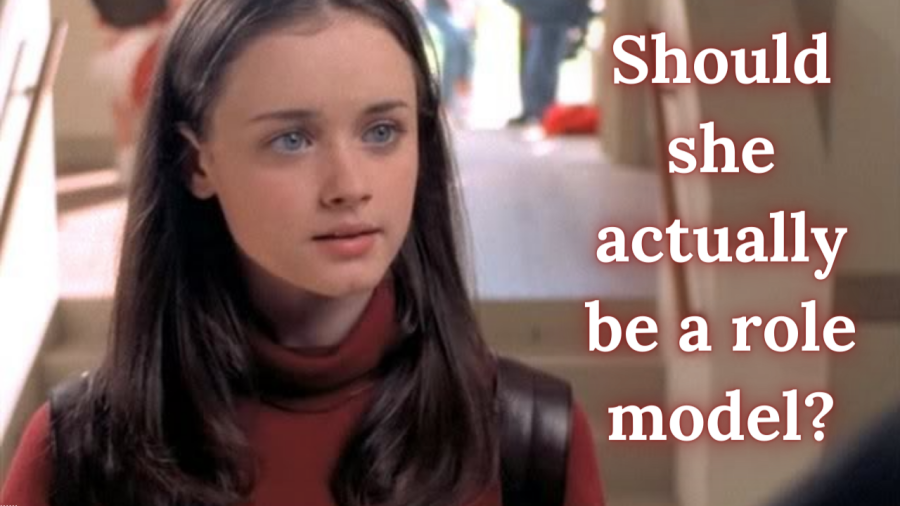The Self-Destructing Ego of Rory Gilmore
October 21, 2022
The month of October brings with it the early signs of fall, and the early signs of fall are a green light to the national phenomenon that is rewatching the early 2000s hit sitcom, Gilmore Girls. Gilmore Girls is set in the fictional town of Stars Hollow, a small New England place full of homey originality that perfectly aligns with the change in season.
The setting isn’t the only reason people obsess over Gilmore Girls. The show follows a closely-knit and quick-witted mother and daughter as they go about the problems of their both simple and complicated lives. Viewers love the dynamic between the comical mother, Lorelai Gilmore, and the serious daughter, Rory Gilmore. Rory has become adored by fans everywhere because, contrary to most main characters at the time, she placed high-value on her schoolwork and, despite her youth, has an immense amount of drive and goals. She was meant to be seen as a role model to viewers, allowing them to recognize the importance of intelligence. While Rory is certainly someone to look up to in these aspects, if you look deeper into her personality, you come to find that she is the perfect example of a cataclysmic sense of self-importance.
Growing up, Rory Gilmore was always well-behaved, polite, and smart. She read books when other kids went out to play and she studied more than most. Her mother, Lorelai Gilmore, in addition to the whole town of Stars Hollow, saw the surface-level diligence of Rory’s actions and decided not to look any further. They viewed her as a perfect, sent-from-heaven angel and treated her as such. In Rory’s defense, when you have a whole town full of people treating you like God, it’s hard not to build up an ego. This ego continued to grow and lift Rory up throughout her childhood, but what goes up must come down.
Early Signs:
When people talk about Rory’s lack of character, they are usually referring to the later seasons. They say things such as “They ruined her character,” and, “I miss the old Rory”. What people fail to realize is that Rory was always self-centered, it was just less noticeable when she was in high school because she was pure potential. Her life still looked like it could truly go somewhere, making her an easy character to root for, creating a bias that mitigates her faults. However, there are still moments in the early seasons when we can see Rory’s self-centered nature starting to build.
A big example of this is Rory’s subtle indifference to her best friend, Lane. There are multiple moments when Lane is trying to confide in Rory, and Rory seems to give her half-hearted responses or simply ignore her and continue talking about herself (example to those who get it: Rich Blumenfeld). This isn’t to say Rory is a bad friend, but she simply does not care as much for Lane as Lane cares for Rory.
Other examples are when Rory misses her mother’s graduation because she spontaneously decided to visit the boy she liked (Jess) in New York. Also, in season 3, Rory ignores Jess so he moves on and gets a girlfriend. Rory proceeds to get upset with him for moving on, and constantly degrades and belittles his new girl whom she knows nothing about out of jealousy. Similar to this, throughout the seasons, Rory makes little, almost unnoticeable, remarks that shoot down standard women and female traits, showcasing her mindset that she is better than those around her. These examples may seem small, but it is little things like these that highlight Rory’s gradual selfishness as it begins to form in the early seasons.
Later On:
As Rory grows, so does her ego. The first big sign of Rory’s ‘downfall’ is when she’s at Yale and has an affair with her married high school boyfriend, Dean. However, the main thing to take away from this is her reaction to being told she was the ‘other woman.” She said things such as, “He’s MY Dean,” implying that she had more of a right to Dean than his literal wife. She blamed the wife for forcing Dean to cheat, and this blatant misogynism was viewed by most as being out-of-character for her due to the ‘feminist’ attitudes of both her and her mother. However, when you factor in her youthful idea that she is more important than others, the trope of the conniving-other-woman actually makes perfect sense for Rory.
After this drama, her entitlement becomes more obvious when she gets into a relationship with trust-fund, too-rich-for-rules Logan Huntzberger. When Rory would get into fights with Logan, it was almost always about self-righteousness. She made it clear she viewed the Huntzbergers as an immoral rich family who gets whatever they want regardless of work. This was ironic because the difference between the Huntzbergers and the Gilmores was minimal. Rory grew up with extremely wealthy grandparents who paid for her education, both at her prestigious and private high school and at Yale. She was the only child of a mother who gave her everything she asked for, and she had a whole town full of people who gave her nothing but praise simply for being ‘nice’.
As the show unfolds, Rory lands an internship with Logan’s father, Mitchum, at his prestigious newspaper. Mitchum is honest with Rory and tells her that he does not believe she has what it takes to become a great journalist. Upon hearing this, Rory, who had built her life around becoming a journalist, proceeds to give up. She immediately throws in the towel, quits Yale, gets arrested for stealing a yacht, burns all her bridges, ignores her mother for months, crashes in her grandparent’s pool house, and starts giving into a life of tea parties and party planning.
At first glance, this seems like such an unnecessary overreaction, and it is. But it’s not unexpected. Rory spent her whole life with people who only lifted her up. She had only ever experienced immense praise from her parents, friends, boyfriends, teachers, peers, colleagues, neighbors, town members, and basically anyone on the show who happened to cross her path. Most of her identity was based on her academic success, and it only took one negative comment to undo everything and cancel out all the applause. When everyone tells you you’re the most important person in the world, you’re bound to start believing it. If she was used to hearing criticism, even constructive, she would not have had such an overstated reaction. But, a false sense of confidence, in other words, an ego, is similar to Christmas lights: One light goes out and suddenly you’re left in darkness.
Fans of Gilmore Girls hate Mitchum for what he said to Rory, but if we’re being honest, he wasn’t wrong. In giving up so easily, Rory proved Mitchum right. She sought a career built on contradiction and negative opinions, and if one wrong opinion caused her to throw in the towel, she really didn’t have what it takes. She eventually goes back to Yale and does alright, but the life she leads does not at all correlate with her build-up.
I won’t go into too much detail about the 4-episode 2016 Netflix reboot titled, “Gilmore Girls: A Year in the Life”, mainly because it was very random and feels out-of-place and unnecessary (personally I don’t really consider it a part of the show). However, this reboot takes place a little over a decade after Rory graduates from college, and her life is not much more than a disappointment. She is unemployed, having an affair (shocker) with her engaged college boyfriend (whom she had turned down when he proposed to her in the original show), is in a relationship with a man whose name she can’t remember, is unable to find a job, and has only really had a handful of successful articles in her entire career.
Upon reflection, Rory Gilmore is a complex character whose identity is entirely built off of those around her. I think it’s important to note that no one ever gave up on her. Despite everything she did, the town and her family continued to praise her, and the show ended with everyone throwing her a huge going away party in the rain. It wasn’t as if the same people who built her up ripped her down, in which case her demise would’ve made sense. Rory’s downfall was at the hands of her own mindset. Sure, other people played into it, and the praise she received as an adolescent was definitely fuel to the fire of her pride. Her confidence was entirely built upon the base of other people’s opinions, and thinking about it in this regard makes me feel a great amount of sadness for the big-eyed and naive girl she once was. The main problem was that Rory was never fully able to be humble. She acted humble on the outside, but internally, it was clear she truly believed in her own self-importance. I don’t want to give the impression that I outright hate Rory, because this isn’t true. Like most characters, there is so much to love and admire about who she is. But, when you’re watching her charming, caffeine-fueled personality on Netflix this fall, make sure to remember Rory is much more than a valedictorian and compassionate daughter: She is, without a doubt, the perfect example of a self-destructive ego.







